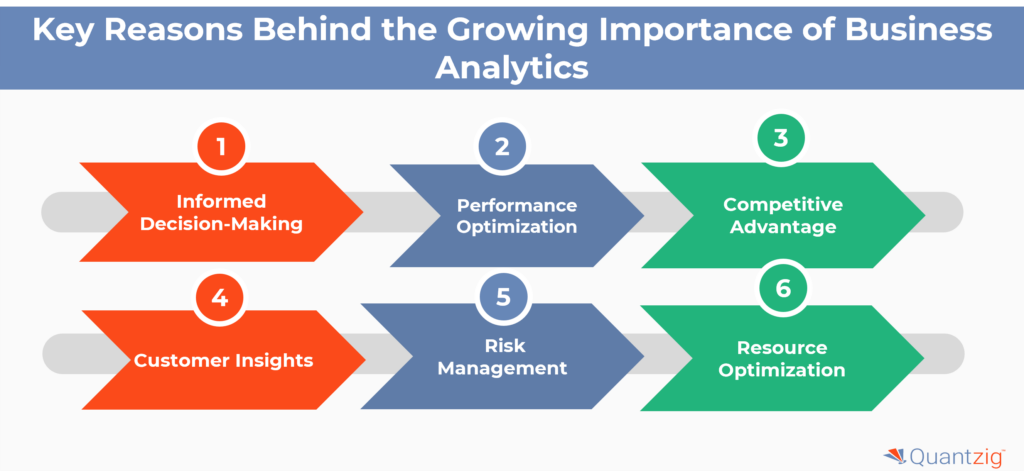The Importance of Business Analytics: A Must-Have Skill You Need to Know Today
Table of Contents

- jaro education
- 28, November 2024
- 4:00 pm
In an era where data is often referred to as the “new oil,” organisations must extract, refine, and utilise it effectively to stay ahead of the curve. Data is everywhere, from the clicks on a website to transactions at a supermarket, and the organisations that can make sense of it thrive. This is why the importance of business analytics has grown exponentially in recent years.
Business analytics is not just a buzzword; the importance of business analytics lies in the fact that it is a critical tool for understanding market trends, solving complex problems, and unlocking new opportunities. Whether you’re a professional aiming to upskill, a manager seeking better decision-making tools, or a business owner looking to optimise operations, the importance of business analytics in your journey cannot be overstated.
What is Business Analytics?
At its core, business analytics involves analysing data to uncover patterns, trends, and insights that drive informed decisions. Unlike traditional approaches to decision-making, which often rely on experience or intuition, business analytics uses facts and data as the foundation for strategy.
It combines statistical methods, data science, and technology to deliver actionable insights that can transform an organisation’s performance. The importance of business analytics lies in its ability to turn raw data into a powerful asset, helping organisations gain a competitive edge in their industries.
The Growing Importance of Business Analytics Across Industries
The rise of business analytics has been driven by the need to adapt to a fast-paced and highly competitive environment. Organisations across industries are now investing heavily in analytics to achieve better outcomes. Here’s how business analytics is making a difference:
Retail and E-commerce
Retailers use analytics to study customer buying behaviours, personalise shopping experiences, and forecast inventory needs. The importance of business analytics in this sector is evident in how it optimises everything from product placement to dynamic pricing strategies.
Healthcare
In healthcare, analytics improves patient outcomes by predicting disease trends, optimising resource allocation, and enhancing treatment plans. The ability to process large amounts of medical data is transforming how care is delivered.
Finance
Financial institutions use analytics for risk management, fraud detection, and investment optimisation. By recognising patterns in transactional data, they can make smarter, faster decisions.
Logistics and Supply Chain
The importance of business analytics in logistics lies in its ability to optimise routes, reduce delivery times, and predict demand fluctuations, ensuring smooth operations.
Why is Business Analytics So Important?
The importance of business analytics goes beyond solving day-to-day challenges. It reshapes how organisations function, innovate, and grow. Let’s explore why it is indispensable:
| Key Areas | How Business Analytics Adds Value |
|---|---|
| Improved Decision-Making | By using data-driven insights, organisations can make more precise and confident decisions. |
| Customer Personalisation | Analytics helps tailor products and services to meet customer preferences, driving satisfaction and loyalty. |
| Operational Efficiency | Identifies inefficiencies in processes and provides solutions to optimise workflows and resource allocation. |
| Competitive Advantage | Businesses that adopt analytics stay ahead by identifying trends and reacting to market changes faster than competitors. |
| Risk Management | Predictive analytics enables organisations to foresee risks and implement preventative measures. |

*Quantzig
The Connection Between Business Analytics & Data Science
While business analytics focuses on interpreting data to solve specific business problems, data science goes a step further by building algorithms and models that predict future trends. Together, business analytics & data science form a powerful combination.
For instance, a company might use data science to create a model that predicts customer churn. Business analytics would then determine how to apply this insight to improve retention strategies. The importance of business analytics is in bridging the gap between data science and actionable business outcomes.
Key Components of a Business Analytics Course Syllabus
For those looking to build expertise in this field, a structured business analytics course syllabus is a great starting point. Here’s what a well-rounded course typically includes:
| Module | Key Takeaways |
|---|---|
| Introduction to Business Analytics | Gain a strong foundation in understanding the principles and importance of business analytics in today’s world. |
| Statistical Techniques | Learn hypothesis testing, regression analysis, and probability distributions to analyse data effectively. |
| Data Visualisation | Master tools like Tableau and Power BI to create compelling dashboards and tell stories through data. |
| Predictive Analytics | Build forecasting models using machine learning techniques to anticipate future trends. |
| Programming Skills | Develop proficiency in Python, R, and SQL for data handling and advanced analysis. |
| Real-World Case Studies | Apply knowledge to solve practical business problems across industries like retail, healthcare, and finance. |
By following such a curriculum, learners not only grasp theoretical concepts but also gain hands-on experience in applying analytics to real-world scenarios.
Future Trends in Business Analytics
As technology evolves, so does the importance of business analytics. Here are some emerging trends to watch:
- Artificial Intelligence and Automation:
AI-powered tools are making analytics faster and more efficient, enabling real-time decision-making. - Self-Service Analytics:
Non-technical professionals can now access easy-to-use analytics tools, democratising data insights. - Focus on Data Ethics:
As data privacy becomes a concern, organisations will emphasise ethical practices in analytics. - Integration with IoT:
Analytics is now being used to process data from Internet of Things (IoT) devices, enhancing industries like smart manufacturing and urban planning.
- Artificial Intelligence and Automation:
Career Benefits of Learning Business Analytics
The importance of business analytics also extends to career growth. Here’s why professionals are flocking to this field:
- High Demand: Organisations across industries are seeking skilled analysts, making it one of the most in-demand skills today.
- Attractive Salaries: Analytics professionals enjoy competitive salaries due to the critical role they play in decision-making.
- Diverse Opportunities: From marketing to operations, analytics skills are valuable in nearly every domain.
- Strategic Impact: Professionals trained in analytics are not just contributors—they become drivers of business strategy.

*IABAC
Take the First Step with IIM Tiruchirappalli
If you’re ready to harness the power and importance of business analytics, the PG Certification Programme in Business Analytics & Applications by IIM Tiruchirappalli, with Jaro Education as the marketing and technology partner, is your gateway to success.
Why Choose This Programme?
- Cutting-Edge Curriculum: The syllabus covers the essentials, from data visualisation to predictive modelling.
- Practical Learning: Engage in real-world projects to build hands-on expertise.
- Expert Faculty: Learn from top academicians and industry veterans.
- Prestigious Brand: IIM Tiruchirappalli stands as a beacon of excellence in management education.
Frequently Asked Questions
The importance of business analytics lies in its ability to transform raw data into actionable insights that support better decision-making and strategic planning. It plays a crucial role in:
-
- Improving Decision-Making: By analysing historical data, businesses can make evidence-based decisions rather than relying on guesswork.
- Enhancing Customer Experience: Analytics helps understand customer behaviour, allowing organisations to tailor their products and services.
- Optimising Operations: Identifying inefficiencies and implementing data-driven solutions to reduce costs and increase productivity.
- Predicting Trends: Through predictive analytics, businesses can foresee future market trends, helping them stay ahead of competitors.
Business analysis involves identifying business needs and determining solutions to address them. These solutions can include process improvements, organisational changes, or the implementation of new technologies.
The importance of business analysis includes:
-
- Clear Requirements: Ensuring stakeholders’ needs are accurately captured and understood.
- Reducing Project Risks: By addressing potential issues early, business analysis minimises the chances of project failures.
- Optimising Resources: Identifies ways to use resources more effectively and eliminate unnecessary processes.
- Driving Change: Supports organisations in adapting to new market demands and adopting innovative strategies.
Analytics is the process of examining data sets to draw meaningful conclusions and guide decision-making. It encompasses techniques like data mining, statistical analysis, and machine learning.
The importance of analytics includes:
-
- Informed Decisions: Provides a solid foundation for strategic and operational decisions.
- Performance Tracking: Helps organisations measure success through key performance indicators (KPIs).
- Problem Solving: Identifies underlying issues within processes or strategies and suggests solutions.
- Forecasting: Predicts future outcomes based on past trends, helping businesses prepare for potential challenges.
There are four main types of business analytics, each serving a unique purpose:
-
- Descriptive Analytics: Focuses on summarising historical data to understand what has happened.
- Diagnostic Analytics: Examines data to explain why certain events occurred.
- Predictive Analytics: Uses statistical models and algorithms to forecast future events.
- Prescriptive Analytics: Recommends actions based on predictive outcomes and optimisation techniques.
Among these, predictive analytics is often considered the most important type because it helps organisations anticipate trends, customer behaviour, and risks. By leveraging predictive models, businesses can prepare for the future and gain a competitive advantage.








